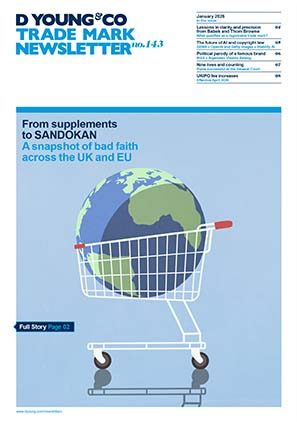A clearer sky ahead: UK Supreme Court delivers final decision in SkyKick saga
After seventeen months of waiting, the Supreme Court has issued its judgment on the long-running dispute between SkyKick and Sky, ruling that a trade mark application can be deemed to be in bad faith if the specification is overly broad in scope or includes sub-categories the applicant never intended to use.
History of the SkyKick dispute
To briefly summarise the journey of the Sky and SkyKick dispute to the Supreme Court:
At the heart of the case, Sky alleged that SkyKick infringed its trade marks by offering email migration and cloud storage services under the SkyKick mark. Sky based its claim on five registered trade marks: four European Union trade marks (EUTMs) and one UK mark, covering a broad range of goods and services, including both class headings and specific terms. In response, SkyKick counterclaimed that the SKY marks were invalid due to unclear specifications and bad faith, arguing that Sky had no intent to use the marks for the broad range of goods and services listed. Initially, Sky relied on all five marks but later narrowed its scope.
The High Court held that SkyKick’s allegations raised legal issues on bad faith that warranted input from the Court of Justice of the European Union (CJEU). The CJEU responded, ruling that an applicant does not need a fully developed intention to use a mark but must have a genuine intention to explore the mark’s viability. If no such intention exists, and the applicant seeks to enforce the mark across a broad range of goods, this could be considered bad faith. However, the CJEU also held that the inference of bad faith could be rebutted if the applicant provided a legitimate commercial rationale for the broad coverage of its mark.
The High Court applied the CJEU’s guidance and found that Sky’s registrations had been partly filed in bad faith, as Sky had no intent to use the marks for certain goods and services, applying for those terms purely as a legal weapon. The High Court reframed Sky’s limited specification to provide it fair protection, and SkyKick was found to have infringed Sky’s trade marks through its services.
The Court of Appeal reversed the High Court’s findings, ruling that SkyKick had failed to prove bad faith, thereby seemingly raising the bar for third parties to succeed in a bad faith claim where there is no intention to use.
UK Supreme Court decision
There were three issues for the Supreme Court to consider:
- Bad faith: whether a trade mark registration can be invalidated, in whole or in part, due to bad faith if the applicant had no genuine intention to use the mark for some or all of the goods or services at the time of application.
- Infringement: whether SkyKick infringed Sky’s trade marks through its email migration and cloud storage services.
- Brexit: whether courts in the United Kingdom retain jurisdiction in actions concerning EUTMs post IP completion day (31 December 2020).
Bad faith
The decision largely endorses the earlier High Court and CJEU SkyKick rulings. In this case, the United Kingdom Intellectual Property Office (UKIPO), acting as an intervener, filed submissions expressing concern over the Court of Appeal’s limitation on bad faith claims, which received significant attention in the decision, particularly in relation to:
- The use of broad specifications;
- The use of overly broad descriptions (class headings); and
- The inference that third parties must specify, at the outset of a claim, which goods or services the applicant should have applied for and which are subject to the bad faith allegation.
Use of broad specifications
In relation to broad specifications, it was held:
- If a person applies to register a mark in all 45 classes, the broad scope of the specification (without explanation) could justify a finding of abuse. Once abuse is suggested, it becomes a matter of degree whether the size and scope of the specification, relative to the size and nature of the applicant’s business (or lack thereof), rebuts the presumption of good faith and justifies a finding of bad faith.
- The key question is whether, in the absence of a consistent explanation for the application’s scope, it is reasonable to infer that the application constitutes abuse based on the size and nature of the listed goods and services and other circumstances.
- Reputation alone does not justify applying to register a trade mark for goods and services the applicant never intended to use, even though the Court of Appeal had given significant weight to Sky’s UK reputation in its earlier decision.
Use of class headings and broad terms
Regarding the use of class headings and broad terms, it was held:
- It would be unfair for traders using broad terms to be in a more favourable position than those using specific sub-categories.
- The matter should be assessed at the time of application, considering whether the applicant was “required” or “encouraged” to use class headings when evaluating bad faith.
- There is no doubt that an application to register a mark for a broad category of goods and services may be partly in bad faith if it includes distinct sub-categories the applicant never intended to use, whether conditionally or otherwise.
The Supreme Court acknowledged that the law is still developing when it comes to using class headings versus more precise descriptions of goods or services. However, even if the law does not require more clarity, it doesn’t stop someone from arguing that an application was made in bad faith by applying for broad categories with no intent to use.
Setting out a bad faith claim
The Supreme Court clarified that the party alleging bad faith may not know the applicant’s true intentions at the time of filing and is unlikely to be able to specify the exact specification the registration should cover. It is accepted that the party making the claim may be constrained to relying on the objective facts available.
Consideration of the facts
The Supreme Court was persuaded that, when considering the history of the dispute, the Court of Appeal had overlooked several key points. Specifically, that Sky initially relied on its full range of goods and services and maintained this position despite the bad faith objection, only narrowing the scope of its claim five weeks before trial and further reducing it in closing submissions. Sky was prepared to “deploy the full armoury” of the SKY marks against a trader whose activities were unlikely to cause confusion and did not amount to passing off. This was viewed as strong support for a finding of bad faith.
Infringement
The Court of Appeal disagreed with the High Court’s finding that email migration services were an “electronic mail service”, and held that “electronic mail services” do not encompass “all services related to electronic mail”. It held that the High Court had extended the core meaning of the term to include an unclear and indeterminate range of services related to electronic mail. The Supreme Court ultimately agreed with this point, maintaining only the infringement finding for the use of SkyKick in relation to cloud backup/storage services.
Brexit
As regards whether UK courts retain jurisdiction over EUTM infringement actions and can apply sanctions across the EU after IP Completion Day, the answer is yes. Article 67(1)(b) of the Withdrawal Agreement allows UK courts to continue handling proceedings involving EUTM infringement proceedings that were commenced before Brexit, and to apply sanctions across the EU. UK courts are also granted additional powers to apply remedies or injunctions to EU comparable trade marks in such circumstances.
Commentary
This decision effectively restores the threshold for bad faith claims to the level originally set by the High Court and CJEU in the earlier SkyKick decisions. The Supreme Court has clarified that each bad faith claim must be assessed on its own facts, with Sky’s conduct in this case being a significant factor in determining bad faith.
While the use of broad specifications and terms may now be sufficient to infer bad faith, applicants are still free to file for class headings and large specifications, and retain the opportunity to rebut any bad faith inference by providing a legitimate “commercial rationale” or reasonable explanation for the filing. As noted by the Supreme Court, an applicant “does not have to have a commercial strategy to use a mark for every possible species of goods or services falling within the specification”. However, applicants should consider their goods and services with a critical eye: if an owner seeks to rely on an overly broad registration without at least a degree of commercial justification, they may well be on the receiving end of a successful bad faith counterclaim.
Case details at a glance
Jurisdiction: England & Wales
Decision level: Supreme Court
Parties: SkyKick UK Ltd and another (appellants) v Sky Ltd and others (respondents)
Citation: 13 November 2024
Date: [2024] UKSC 36
Decision: dycip.com/sky-skykick-supreme-court
Related articles
We have closely followed the developments in this dispute over the years and have released a series of articles on each of the previous judgments. These offer a detailed analysis of the legal arguments and rulings at each stage of the litigation.
- 21 September 2021, Sky v SkyKick Court of Appeal issues judgment: dycip.com/sky-skykick-court-appeal
- 04 May 2020, Sky v SkyKick UK High Court decision: dycip.com/sky-skykick-high-court
- 31 January 2020, Sky v SkyKick CJEU decision: dycip.com/sky-skykick-cjeu
- 11 November 2019, Shooting for the stars? Have faith. Why the SkyKick case is important for brand owners: dycip.com/sky-skykick-cjeu-questions
- 08 November 2018, Sky v SkyKick. Clarity and bad faith in trade marks: dycip.com/3sky-skykick-high-court-questions

